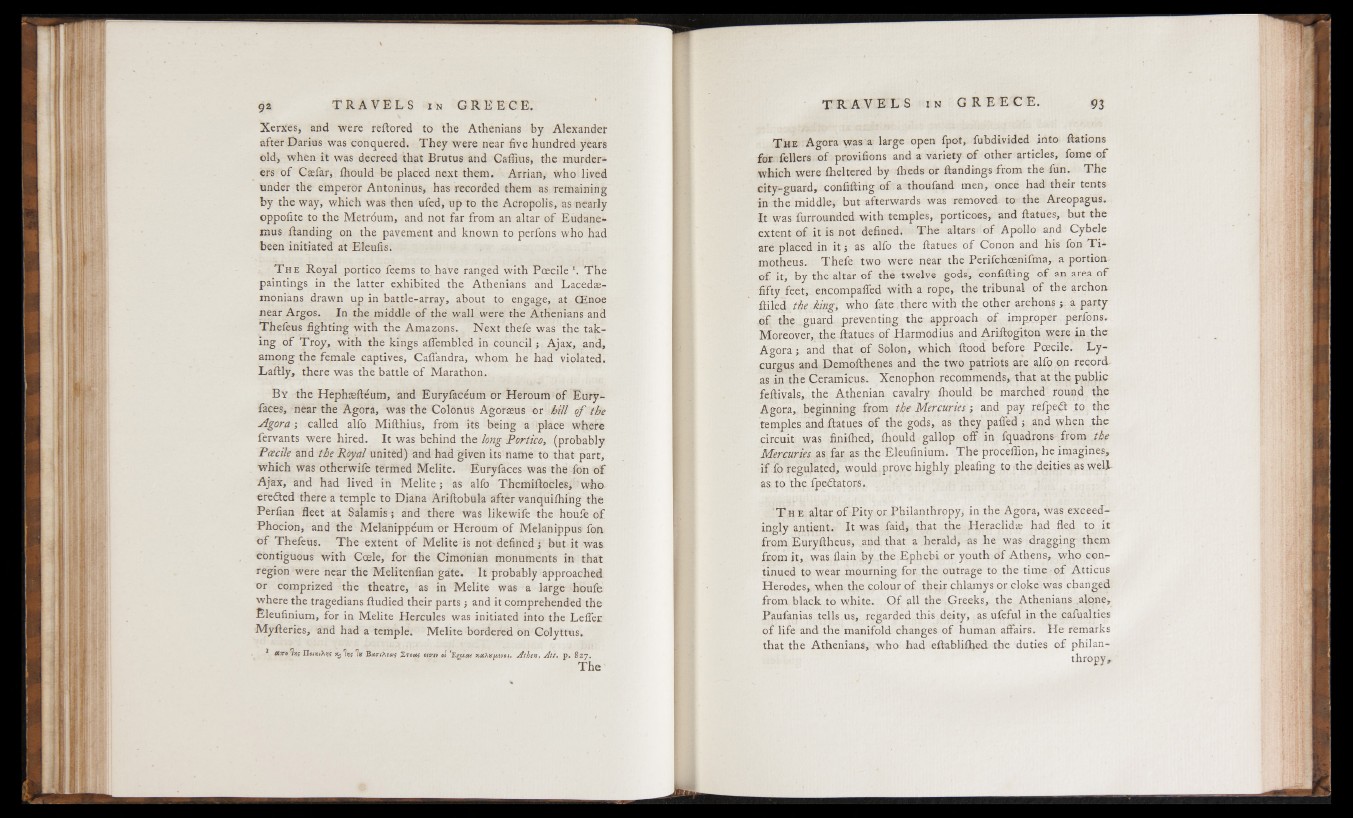
Xerxes, and were reftored to ihe Athenians by Alexander
after Darias was conquered. They were near five hundred years
old> when it was decreed that Bratus and Gaffins, the murder*
ere of Csefarj. fhould be placed next them. Arrian, who.lived
trader the emperor Antoninus, has recorded them las. remaining
by the way, which was «then lifed, up to the Acropolis,= «early
oppofite to the Metroum, and not far from an altar of Eudane*-
mus Handing on the pavement and known to perfons who had
been Initiated* at Eleufis;
T he Royal portico feems to haVe ranged with Poecile The
paintings in the latter exhibited the Athenians and T/acedae-
monians drawn up in battle-array, ahout -tp engage,^ at OJnoe
near Argps. In the middle o f the wall were the Athenians and
Thefeus fighting with the Amazons* Next thefe\yas 'the talking
of Troy, with the kings affemble^xn houncUVs ^jax, and,
among the female captives, Caffandra, whoin he had violated.
Laffiy, there was the battle of Marathon,..
By -the Hephasffeuta, and Euryfecbum or Hetourh >df Eury-
iaees, near the Agora, was the Coldliiis Agoraeus or ’Mil of the
Agora*, called alfo Miffhius, fro® ftfolMng a ’pkce wlxsfe
fervants were hired. It was.behind the ikngp&r^ieo, ^r^tyakshy
Puscik and the'Royal united) and had given itsfia®©?® that? jfert;
Which was otherwife termed Melite* E u n ic e s wasthe-fen
Ajax, and had lived in Melite 5‘‘as alfo TherhirtOdleSf • who
eredted there-a temple to Dkna Ariftobiila after Vaii^tillhihg the
Perfian fleet at Salamis-; and there Was like Wife Hie h&ufe Of
Phocion, and the Melaftippeuto or Merdum <ff Melanippus fon
b f Thefeus. The extent >8$ Melite is not-defined j but.it was
contiguous with Gdele, for the Clmdnian monuments in that
region -were near the Melitenfiangate. It probably approaohfed.
nr Comprized -the theatre, as in Melite was a large- >hbufe
where the tragedians fludied their parts} and it comprehended the
Eleufinium, for in Melite Hercules was initiated into the Leffex
Myfferies, a’rid had a temple. Melite bordered on Golyttus*
1 icmHiis UeixiMt K) %{ % Bx n k fte ; Sr«« *mn « 'E^u m X4t\ttp,tnu Athen, Ait, p. 8- i f f
The'
T he Agora was .a- large open fpot, fuhdivided into Rations
fox fellers..of proydfiems and a variety ©f other articles, feme of
which werePheltered by feeds or ftandfogsfeom the Tun. The
citys-guard, ccaifii&irig a t hoUfand men, once had their tents
in iheimiddle^ brat afterwards was removed, ter; the Areopagus.
I t was. forraaraded with; temples,, porticoes, and Hatties, hut the
extent of. it is; not defined. The altars-; of ApoliO apd Cybele
are* placed in WwS® alfo tire ftatues of- Conon and his fpn Ti-
nsotheus.. Thefe two- were near, the Perifchcenifma, a portion,
of it, by the altar of fee-twelve godsf confiding of an area of
•fifty_feet, .encompaffed wife a rope, the tribunal of the archoii
Hile^ tp,$pgi who fere , there with tire other arehons ffe party
.©£ fee.gpafe .preventing the ^ improper perfons*
Moreover,-the Hatues qf ^armodius and AriHogiton ^ere ip.the
Agora. •,* and that of Solon,, which 'Hood before Pcecife* Ly-
cprgus and f)emoHhenes and the two patriots are alfo. PP reqord-
as in the Ceramicus. Xenophon recommends», that at the
foAiyals, the Athenian cavalry fliould be marched rourad the
Agora, .beginning fr.om the Mercuries > and p^y .relpefe jfo fee
remplesfenditatues of tire gods, as thpy pafied i f *
rirriVh L a J ffoiflied, Hiould gallop off in fquadrons- from the
Mercuries,as fee EJjeufinium. The proceffion, he imagine?»
if fo regujated, wouldjpmye highlyi pleafing to feeder ties, as weU-
as to the fpedhators, ;
‘T«fe. aitar of^itypt. Phil3nthrppyiin the Agora, was exceedingly
It wfp^'fe^. th,at .the had fled to it
from EuryHheus, and that a herald, as he was -dragging them
from it. wasflain jay feeRphebior youth o‘f Athens, who continued
to wear mourning for. the outrage to the time *ef Atticus
Herodes» when the colour o f theft chlarays orcloke'-was changed:
from, black to white.; -Of all the lpreeks, the Athenians .alqne»
Paefenias,tells,us, regarded this,deity, as ufeful in the oafoalties
of life and the manifold changes of human affairs* He rbmarks
that the Athenians, :who had effablifoed the duties o£ philan-;
thropy»